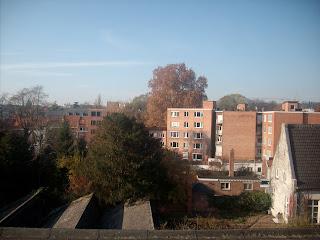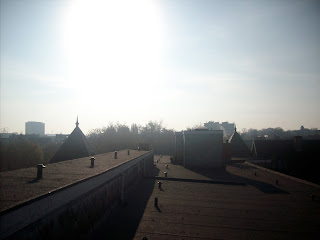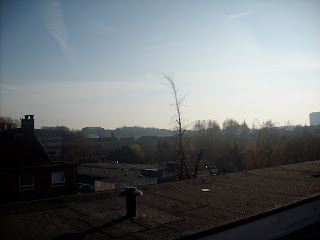This is the first post in a series, which may itself be the first installment in a meta-series that I hope will accomplish two things. First, I hope it will help me to think through the thesis that I have begun sketching in short, panicked bursts; second, I hope it will be of some general benefit to anyone interested in the questions, problems, and thinkers associated with the "theological" sliver that has pricked phenomenology in recent decades. I also hope that it might be of even more general interest, specifically for anyone who has an abiding interest in the life of faith and its interaction with philosophy.
* * *
The central text I'm using for my thesis (as I presently envision it) is "The Wounded Word: The Phenomenology of Prayer" by French philosopher Jean-Louis Chrétien. Posts that follow in the present series will comprise observations, riffs, and explications that refer to his text (the essay appears in the volume
Phenomenology and the "Theological Turn": The French Debate, Fordham University Press, 2000).
This first installment attempts to locate Chrétien's analysis of prayer in its philosophical context. For a way "in" to what he's actually doing, it is helpful to remember that he is attempting a very specific sort of analysis, as the title indicates. Phenomenology examines the essences of things that appear from the perspective of those to whom those things appear - namely, human beings. Since this is the only perspective available to human beings, phenomenology was originally conceived as a movement that would provide a new (or restore an original) foundation for human thought, supplanting the rampant scientism that still persists with more than a century's remove from the publishing year of the phenomenological movement's founding text (Edmund Husserl's
Logical Investigations, 1901).
The methodology used to produce phenomenological analyses requires a number of intellectual preparations. One of these we may informally refer to as "the reduction." (There are different reductions, but for our purposes we may refer to "the reduction" as a single thing to represent all of them.) The reduction entails a suspension of one's natural assumptions about the object of investigation, to the highest degree that it is possible; basically, a phenomenologist tries to put their prior beliefs about the object on hold while they carry out their analysis, so that aspects of the object might emerge in clarity that would otherwise be lost.
Sometimes this is a function of how utterly familiar the object, or an aspect of the object, is to the observer. For example, my own tongue is so familiar to me that unless I am provoked by the pain of a sore or the taste of a food I am eating, I am generally unconscious of it. The reduction is partially intended to overcome the sort of invisibility that an object like this acquires as a function of its nearness and familiarity. If one were conducting an analysis of taste or chewing, one would have to relearn to experience (or "see") one's tongue, so as to be able to throw light on the tongue's place in the phenomenon of taste or chewing. I should say that I am sorry if you are now
thinking about your tongue.
The reduction also enables a person to reconsider everything associated with the phenomenon she is investigating, so as to come around to an understanding of its essence that is (to whatever degree possible) unencumbered by her assumptions. In the case of a pencil eraser, for example, bracketing my belief that pencil erasers are pink would allow me to reconsider my belief that pinkness is essential to pencil erasers (an assumption that is a product of my having only ever encountered pink pencil erasers). Completing the reduction, then, helps me toward a fresh realization: that the pinkness of the eraser in question is a contingent aspect of it, since there can be erasers of other colors that may be attached to pencils. This isn't exactly an epochal discovery, but hopefully it illustrates one of the benefits of phenomenology's reduction.
So, the reduction is important to phenomenological inquiry and helps to distinguish it from other modes of philosophical analysis. There are two ways in which this is significant for a phenomenological investigation of prayer:
- Dominique Janicaud, giving voice to the concerns of many contemporary phenomenologists, believes a phenomenology of religious phenomena to be impossible, because any analysis of this sort would require reference to the framework of religious beliefs that gives religious phenomena their sense; the phenomenological reduction would exclude these beliefs, therefore making a religious phenomenology impossible. Examining religious phenomena in a precise and insightful way is still an option on the table, Janicaud claims; it's just that that sort of analysis simply falls outside the proper purview of phenomenological inquiry, and belongs instead to hermeneutics or straight-up theology. But Chrétien and other philosophers like him are developing phenomenologies that they claim are accurate to the phenomena under description as well as to the project of phenomenology itself. Can prayer, an essentially religious phenomenon, be described without importing theology or metaphysics?
- Chrétien seeks to work within the strictures of phenomenology, even while developing an account of prayer that is informed by an array of theological sources. These sources are not so much a set of metaphysical or theological touchstones as a source of illumination for the lived experience of prayer; they throw light back out of their respective bodies of (bracketed) metaphysical and theological belief. The belief systems (or, I should say, the truth of the belief systems) that he borrows insights from are unimportant to Chrétien's analysis on the whole, and the analysis is built to work even after actual belief in God and transcendence has also been bracketed in the reduction. This means that Chrétien does not explicitly develop a theology, although the degree to which his work might be considered theological as opposed to purely phenomenological is still debated.
(TL;DR) From the perspective of the reduction (numbers one and two above), first, Chrétien's analysis of prayer, if successful as a phenomenology, may be important for the practice of phenomenology generally; second, the type of analysis Chrétien is doing does not permit him to define the essence of prayer according to a particular theology, as would be the case in another context.
With these theoretical items in our handbag, we are almost ready to board the Chrétien prayer train. But first, there is still some further preparatory work concerning phenomenology. I'll save this for installment number two.
















































